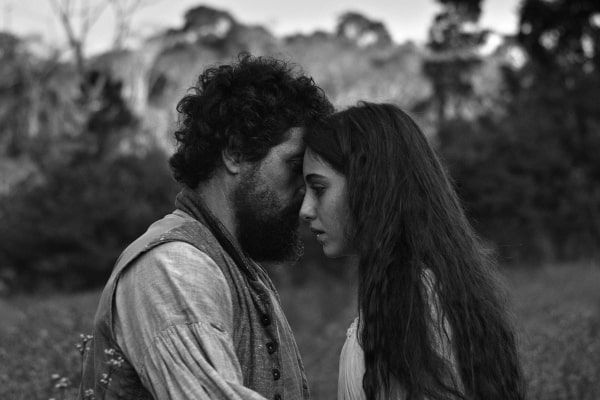Eye For Film >> Movies >> Vazante (2016) Film Review
Vazante
Reviewed by: Jennie Kermode

When European settlers first made their way to Brazil, they were promised parcels of land so large, compared to what they were used to, that they must have seemed like a divine gift. Jewels, too, were to be found in this land in abundance; and to work it they would have Africans whom they didn't feel obliged to recognise as human, kept in chains. But jewels don't last, different pieces of land are not equal in their capacity to produce valuable crops, slavery is difficult to sustain and ultimately, even in a big country, life can come to feel constrained and small.
For António (Adriano Carvalho), it all seems too much to bear. After the death of his wife he goes wandering, returning only with reluctance to take up his duties on the family land. There his troubles are assuaged to an extent by a black freedman (Fabrício Boliveira) who explains that the land can be turned into a profitable farm. He acquires a child bride, Beatriz (Luana Nastas), and a slave woman, Feliciana (Jai Baptista) to keep his bed warm until she matures. Yet this exploitation of women, and his increased harshness with other enslaved people, seems to bring him no real comfort, riddled as he is by existential dread. It's almost as if he can see the future - his own, and Brazil's - and the doom hanging over this way of life.

Portents of doom are close at hand, in the newly imported enslaved people whose language nobody knows and who have no intention of submitting quietly to the yoke; in the elderly mother-in-law who sits in her rocking chair and regards António with eyes alert to all his sins; and in the lonely, wistful Beatriz's growing infatuation with Felicina's sweet-natured son Virgílio (Vinicius dos Anjos). There's a naturalness about this latter relationship that brings into sharp relief the artificiality of the power structures constraining every other interaction. It's a promise of a more hopeful future, though the two young people may not have very much hope for themselves.
Can one sympathise with a man like António? Whilst Vazante shows us his suffering, it doesn't present him as a victim on a par with those around him. Such judgements are not a necessary part of the narrative, though in this claustrophobic space it's easy to believe in a judgemental God. More than anything, António comes across as lost, a man out of place. The freedman and the enslaved have a better understanding of the land. The women, who find affinity with one another regardless of race, seem to possess a social awareness from which he is excluded. The plight of a white man who maintains theoretical control but must resort to increasingly desperate measures to wield any real power gives this historical tale plenty of contemporary relevance.
Inti Briones's muddy, saturated black and white imagery complements director Daniela Thomas' tight close-ups and lingering landscape shots in conveying both the paradox of the location and the pressure its inhabitants feel. Carvalho's eyes reveal a sensitivity and intelligence that he rarely allows to influence his actions, giving him a haunted look. Nastas' thin body and long, flowing hair blend into the long grass and the shrubs, making her part of the landscape, adding to Beatriz's objectification in António's eyes yet suggesting that she belongs here in a way he never can. Thomas has a way of bringing enslaved people into the background of every early scene between the two, emphasising both the unspoken nature of their relationship and the abuse that facilitates their more comfortable standard of living, the guilt that António can never get away from.
Visually absorbing and narratively compelling, Vazante is a character study that uses uncomfortable intimacies to address expansive human concerns. It's a powerful portrait of a time and place whose cruelties continue to resonate in Brazilian society today.
Reviewed on: 04 May 2018















